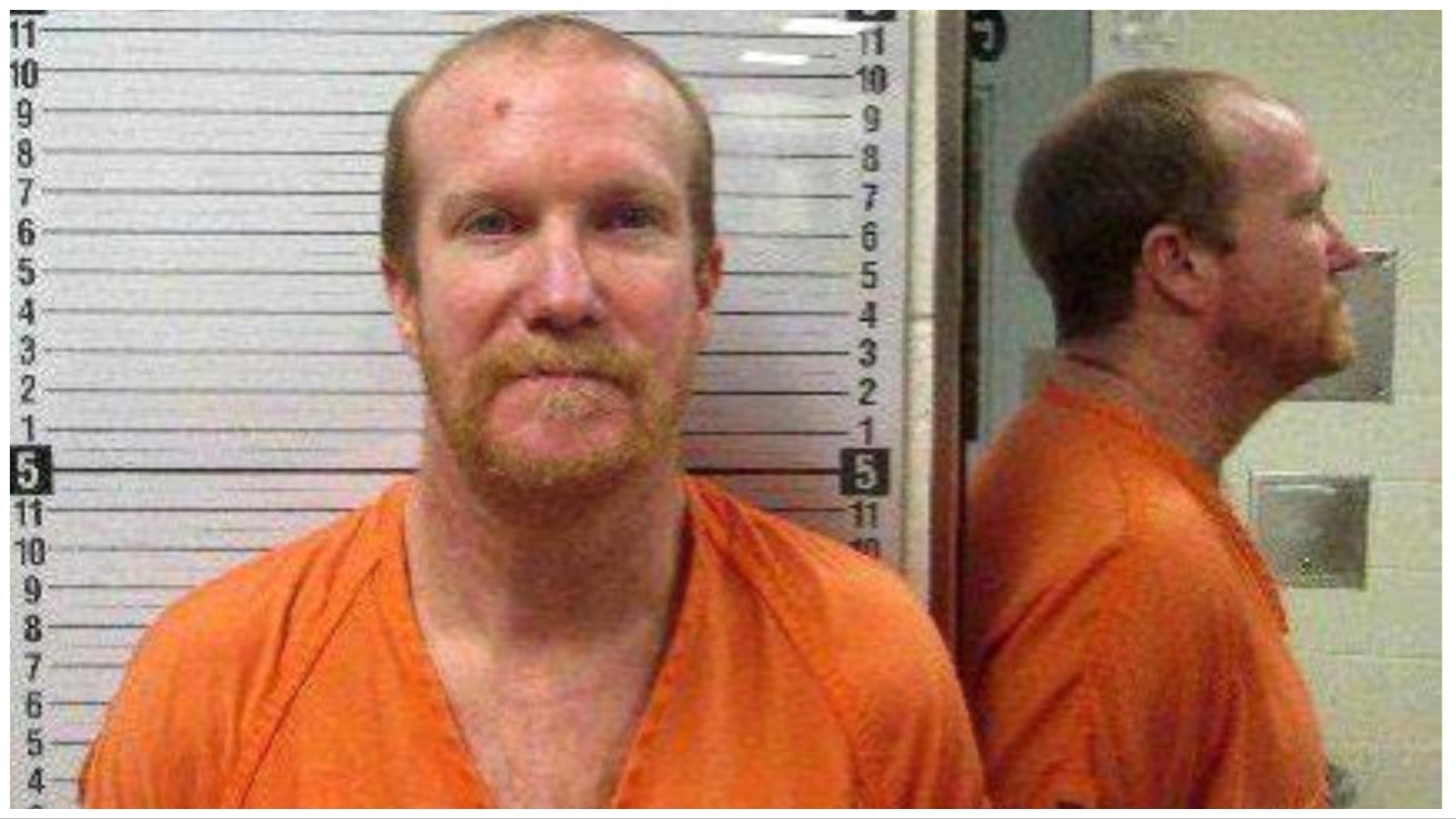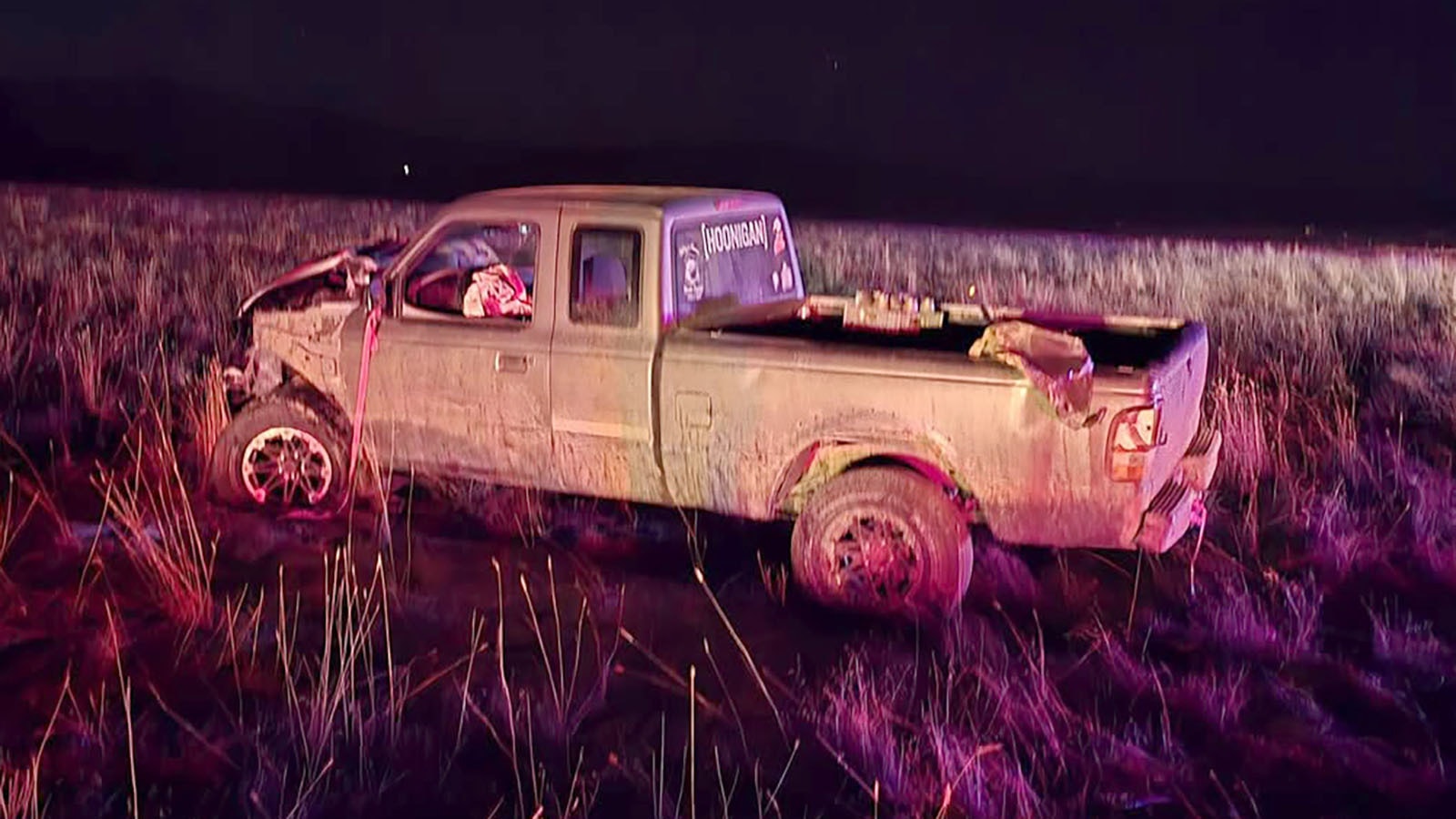A Cody judge is deciding whether a man with brain damage is mentally quick enough to understand court testimony accusing him of killing a woman, dumping her body in a ravine and leading law enforcement on a high-speed chase.
Joseph Underwood, 49, was originally charged with first-degree murder in Cheyenne for the 2019 strangling of Angela Elizondo, who was then 40.
The case dragged on for more than two years until Laramie County District Court Judge Peter Froelicher dismissed it Aug. 19, 2022, ruling Underwood was not mentally fit to stand trial.
Park County authorities took over the case and charged Underwood with concealing a felony by dumping Elizondo’s body in a ravine in Park County, possessing a gun unlawfully, interfering with police and eluding.
Multiple psychiatric evaluations followed, as Cody Circuit Court Judge Joseph Darrah tried to determine if Underwood is mentally fit to participate in his own defense.
And in a court hearing held in Powell on Wednesday, two psychologists dueled over that question.
He Understands
One, Dr. Steven Nelson, said the judge and attorneys could slow down a trial and offer other accommodations to get Underwood through the proceeding.
The other, Dr. Daniel Martell, said doing so would not be practical.
Beyond this disagreement point, these doctors and others who did not appear in court Wednesday agree that Underwood understands the charges against him and how court works, according to court testimony.
Darrah decided to take the matter under advisement.
“My concern is how to measure this. How do we measure whether or not this is effective? Who do I rely on?” said Darrah, adding that he’d have to rely on Underwood’s defense attorney to give him feedback throughout a hearing about whether Underwood was understanding it.
Darrah would not be presiding over Underwood’s trial, but may have to oversee a preliminary hearing to determine whether there’s probable cause to continue the case to the felony-level Park County District Court.
Hoodwinked
Nelson doesn’t doubt that Underwood suffered brain damage in a 1992 motorcycle crash, or that he has consequences from shooting himself through the side of his skull during a police standoff in 2014, the doctor said.
But Underwood seems to be exaggerating his memory loss and other symptoms, Nelson opined.
“I’ve seen documentation as far back as 2004 indicating that Mr. Underwood has a tendency to blame his physical limitations for his anti-social behavior,” said Nelson, adding that Underwood has held a truck-driver job, a commercial driving license and has taken care of himself while out in the world, but demonstrates poorer functioning when called to account for his alleged crimes.
For example, Underwood discussed in some detail with law enforcement how and where he reportedly hid Elizondo’s body, Nelson said. But when Nelson asked him about that three years later, he behaved as though he couldn’t remember those events.
“When you’re confronted with that magnitude, someone feigning and trying to avoid responsibility in that way, then you have to question everything related to their presentation,” he said.
Always Slow, Though
Martell, conversely, testified that Underwood was slow even before he got into a motorcycle crash at the age of 18. He repeated both kindergarten and the fifth grade; he didn’t graduate high school; his IQ is between 74-83, according to court testimony.
And though the 2014 bullet didn’t go through Underwood’s brain, it still could have damaged it by “sloshing (it) around inside the skull,” Martell said.
Multiple doctors subjected Underwood to tests to catch if he was “malingering” or faking mental incompetency, and Underwood passed those tests, said Martell.
And while Underwood may seem to misremember where he should be remembering events, that’s not the concern, Martell said, adding that his concern is with the real-time, high-stress, high-stakes pressure of keeping up with trial, when Underwood has attention, processing speed and verbal learning struggles.
“These kind of functional inabilities are the kind of weaknesses that I feel render him unfit,” he said.
I Don’t Care What It Takes
Park County Deputy Attorney Jack Hatfield II conceded that Underwood is “pretty slow,” but he also hearkened back to the snap decisions Underwood allegedly made when leading law enforcement agents on a high-speed chase away from the ravine.
“There’s obviously something wrong with Mr. Underwood, and the fact that he’s slow isn’t any different than just about any murder defendant in this country,” said Hatfield. “Nothing says if you have that level of IQ you can’t be tried for murder, body-dump, fleeing from law enforcement, possessing a firearm when you’re not supposed to – just like every other criminal in this country.”
Hatfield said he doesn’t care if the preliminary hearing (often a half-day process) takes five days and he has to give defense attorney Sam Krone $50 for energy drinks for Underwood — he wants to prosecute him.
The prosecutor said he’d also been watching Hatfield — who appeared via video from the Park County Detention Center — throughout Wednesday’s hearing.
“How quickly he can (raise his hand) in getting the court’s attention,” said Hatfield, adding that Underwood repeated a distinct gesture whenever Nelson said something he didn’t like. Underwood took notes while Hatfield grilled Martell during cross-examination, the prosecutor said.
His Constitutional Rights
Krone argued back, saying trying new mitigation strategies on hearings would violate Underwood’s constitutional rights. He must have a “rational understanding and rational ability” to assist in his own defense, under Wyoming case law, Krone said.
He then asked what would happen if the state allowed the preliminary hearing to unfold over 25 days, and at the final stage Underwood says he didn’t understand it.
“What do we do then?” asked Krone.
He asked the judge to find Underwood incompetent.
Darrah said he shares the concern but sees both sides of the argument.
Mother Remembers
Elizondo’s mother, Cecilia Elizondo, wanted to address Darrah before the competency arguments started.
Darrah and Krone questioned whether a mother’s testimony is relevant to a competency hearing, where the lone objective is to determine the defendant’s mental status, not his guilt.
Hatfield quoted the Victim’s Bill of Rights, which promises victims the chance to speak at hearings, and Darrah allowed the testimony.
“I wish I could forget how we got here today,” said Cecilia Elizondo, recounting how Underwood had stalked her daughter, Angela, prior to her death. When Angela was terrified and harangued, Cecilia held her until she cried.
“He was calculated, intentional and meticulous,” she said. “I am haunted to this day by the image of him driving by my home, smirking and saluting me.”
She was frustrated with the systems that have protracted the case for nearly five years.
“The system is built to protect the predators, not the victims,” she said. “For years we’ve been led to believe that if we stayed silent and allowed the state to do its job, at the end of a long process there would be accountability.”
She pleaded for accountability, for “Angela’s voice to be heard,” and for Underwood to be prevented from harming others.
Court Documents Say
Court documents allege that Underwood picked up Elizondo and took her to his home Nov. 1, 2019. He gave her a massage, she took a shower, she got dressed, and then they had a talk about their inability to trust one another, according to Underwood’s interviews conveyed in his case affidavit.
He followed her into the bathroom, Underwood later told investigators, then he blacked out and came back to consciousness to find himself sitting on her chest while she lay on her back in the bathroom area.
Underwood realized she was dead, the affidavit alleges, and he pulled down her pants and had sex with her body.
At The Walmart
Underwood told investigators he went to Walmart and bought a rope and red handcart, which he then used to load the woman’s body into his white 2007 Chevy Silverado and drive her to Highway 120 South between Cody and Meeteetse, the affidavit says.
He drove west off the highway onto a two-track road near a private ranch about a mile and a half, then drove another half mile down another two-track road to an area where a small creek runs through a ravine bed.
Underwood allegedly put the woman’s body, still wrapped in a bedsheet and tied to the handcart, into the creek bed in the ravine.
Because It’s Hunting Season
Here the alleged facts fork into Park County jurisdiction.
A hunter found the woman’s body in the ravine the day after her death, and Park County Sheriff’s Deputy Robert R. Cooke responded to secure the scene that evening.
At about 10:43 p.m. Cooke watched a vehicle, which he later identified as a white truck, headed his direction. Headlights appeared in the dark as if someone had just switched them on, reads Cooke’s affidavit in Underwood’s Park County case.
Cooke radioed dispatch to ask if other law enforcement agents were coming out to help him. Dispatch said no: That vehicle wasn’t another agent.
The vehicle turned its headlights off again and loitered about 100 yards from Cooke’s vehicle.
Cooke switched on his spotlight and peered through binoculars at the truck.
The truck loitered for about 13 minutes, the affidavit says.
Then it approached Cooke again, and he turned on his police lights. The vehicle stopped and backed up, turning around at about 10:57 p.m., headed back for the highway.
The Chase
Cooke called for more agents, summoning Wyoming Highway Patrol troopers, sheriff’s deputies and Bureau of Land Management Ranger Robert Lind.
Cooke struggled to keep up as he followed the white truck on the two-track road, but he and the other agents were able to get behind the vehicle as it raced east on the highway then turned left toward Meeteetse.
A trooper executed a traffic stop. Cooke ran the truck’s registration and linked the truck to Joseph Underwood, whom Cooke knew from previous law-enforcement contacts, the affidavit says.
Others told Cooke that Underwood had a handgun trained on his head and was threatening repeatedly to kill himself.
The various agents tried talking Underwood down, but it did no good.
This Scar
Lind visited with Underwood, who said he’d shot himself before with a .38-caliber pistol near his right temple and still had the scar.
Lind asked if he could feel the scar, the affidavit says.
“And when Joe let him touch the scar, Robert lunged through the open window,” wrote Cooke later.
Lind grabbed the pistol. A round ejected from the chamber as Lind grabbed it. The pistol flew from Underwood’s hand and landed on the truck’s passenger seat.
Lind kept wrestling with Underwood, but when Underwood broke away from Lind’s grasp, both Lind and Cooke pointed their guns at Underwood and commanded him not to move, says the affidavit.
Lind then holstered his weapon and wrestled some more as Underwood reached for his own 9 mm pistol.
Cooke tased Underwood.
Lind opened the truck door, and Underwood rolled onto the highway.
“All right, all right, I quit, I quit,” said Underwood as the taser cycled, the affidavit relates.
Agents took Underwood to the Park County Detention Center without further incident.
Fetus In Your Truck
DCI agents interviewed Underwood multiple times in the jail, says the Laramie County affidavit.
They asked him if they’d find anything concerning in his truck. Underwood reportedly said his girlfriend’s clothes were in the truck along with both their cellphones, a 9 mm handgun and a fetus in a butter container.
The fetus was from his girlfriend’s miscarriage from one or two months before her death, according to Underwood’s interview. He was the father of the fetus and had planned on burying it in Park County, he told DCI agents.
More Reading
Murder Charges Dropped In Laramie County, New Charges Filed In Park County
Court Rules Man Charged With Murder, Necrophilia Can Get Mental Health Test
Necrophilia Not Against The Law In Wyoming, But That's Probably OK
Clair McFarland can be reached at clair@cowboystatedaily.com.





